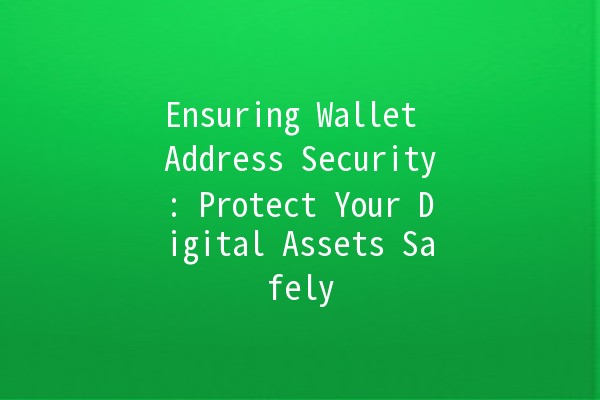
In an age where digital currencies have gained astonishing popularity, the security of your wallet address is paramount. Wallet addresses act as gateways to your cryptocurrency funds, making them prime targets for theft and fraud. In this article, we will explore practical tips and techniques to enhance your wallet address security, ensuring that your digital assets remain safe and secure.
Understanding Wallet Addresses
A wallet address is a unique string of letters and numbers used to receive and send cryptocurrency. Each currency has its type of wallet address – for example, Bitcoin addresses start with a "1" or a "3", while Ethereum addresses start with "0x". Understanding the nature of these addresses is crucial, as any exposure or leak can lead to unwanted transactions and financial loss.
Practical Tips for Wallet Address Security
Explanation:
Hardware wallets are physical devices designed to store your private keys offline, making them significantly secure against online threats. Unlike software wallets that are connected to the internet, hardware wallets keep your information on a device disconnected from phishing scams and malware.

Application Example:
Invest in a reputable hardware wallet like Ledger Nano S or Trezor. When you need to perform a transaction, you can connect it to your computer, make the transaction, and then disconnect it. This way, even if your computer is compromised, your funds remain secure.
Explanation:
Twofactor authentication adds an extra layer of security by requiring a second form of verification in addition to your password. This may involve a text message, email confirmation, or an authentication app.
Application Example:
For wallets that support it, enable 2FA through an app like Google Authenticator. Ensure that your primary email account used for activating 2FA is secured with a strong password and is also protected by 2FA for enhanced security. This makes unauthorized access much more difficult.
Explanation:
Wallet software regularly releases updates to patch security vulnerabilities and add new features. Using outdated software can leave you exposed to known security flaws.
Application Example:
Make it a habit to check for wallet updates on a monthly basis. When updates are available, take the time to download and install them immediately. Make sure to back up your wallet before performing any updates.
Explanation:
Phishing attacks trick users into providing sensitive information by masquerading as trustworthy entities. These can take the form of deceptive emails, fake websites, or social media messages.
Application Example:
Always verify the URL of websites before logging in and avoid clicking on links within emails from unknown senders. If you receive an unsolicited message asking for your wallet address, treat it as suspicious. When in doubt, visit the official website directly instead of clicking on links.
Explanation:
Regular backups of your wallet ensure that you can recover your funds in case of device failure or loss. A backup typically contains all your private keys, along with transaction history and wallet settings.
Application Example:
Set a routine to back up your wallet every month. Use encrypted USB drives to store your backups if you need to keep them offline. Make sure these backups are stored in a safe place, separate from your main devices.
Frequently Asked Questions
What is a wallet address, and why is it important?
A wallet address is a unique identifier for your cryptocurrency wallet. It allows you to receive and send cryptocurrencies. The importance of a wallet address lies in its security; if compromised, your funds can be easily accessed without your permission. Thus, maintaining a secure wallet address is crucial for safeguarding your assets.
How can I tell if my wallet address has been compromised?
Indicators of a compromised wallet address include unauthorized transactions or funds disappearing unexpectedly. Additionally, if you receive notifications of login attempts that you did not make, it’s a red flag that your account may have been accessed without your consent. Regularly monitoring your wallet activity can help you catch suspicious activity early on.
Is it safe to share my wallet address?
While sharing your wallet address for receiving funds is generally safe, you should be cautious about sharing it publicly. Avoid posting your wallet address on forums or social media to reduce the risk of targeted attacks. Always consider the potential implications of making your address widely known.
What should I do if I suspect my wallet address has been hacked?
If you suspect that your wallet address has been hacked, act immediately. Move any remaining funds to a new wallet that has not been compromised. Report suspicious activity to your wallet provider and review the proper steps for securing your other accounts and devices. Ensure that you follow the best practices previously mentioned in this article.
Can I recover my funds if I lose access to my wallet?
Recovery depends on how you have stored your wallet. If you have backed up your private keys or seed phrase, you can regain access to your wallet by restoring from that backup. If you haven’t made a backup, unfortunately, it can be difficult or impossible to recover the funds linked to that wallet.
What are the best wallet practices for beginners?
Beginners should start by researching their options, using reputable wallets, and familiarizing themselves with security practices. Always prioritize strong passwords, enable 2FA, and regularly back up your wallet. Staying informed about the latest security threats is also vital for maintaining a secure wallet.
Securing your wallet address is crucial for safeguarding your cryptocurrency assets. By implementing the techniques discussed in this article, you can significantly enhance the security of your wallet address and minimize the chances of falling victim to cyber threats. Protecting your digital wealth requires diligence, so make security a priority in your cryptocurrency journey.

